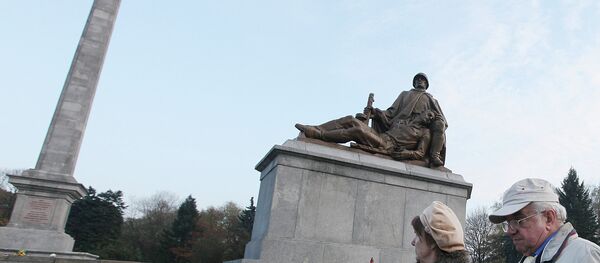The remarks were quick to spark outrage in Poland, with ordinary Poles, the media and politicians jumping in to comment. The controversy went all the way to the top, with President Bronislaw Komorowski stating that Comey's comments were an "insult to thousands of Poles who helped Jews," and demonstrated a serious "lack of historical knowledge." The president noted that they will require "a reaction from the Polish state."
That reaction amounted to an official summons of the US Ambassador to Poland by the Foreign Ministry on Sunday. Ambassador Stephen Mull responded the very same day, stating that Comey's remarks were "wrong, damaging and offensive," noting that "Nazi Germany alone bears responsibility [for the Holocaust]," and adding that he now has "a lot of work [to do] to make things right in this situation."
Ambasador @SteveMullUSA zostanie wezwany do @MSZ_RP w zw. z wypowiedzią dyrektora FBI. Otrzyma notę z protestem i wezwaniem do przeprosin.
— Marcin Wojciechowski (@maw75) 19 апреля 2015
"Ambassador @SteveMullUSA has been summoned by the Polish Foreign Ministry in conjunction with a statement by the Director of the FBI. He has received a note of protest and a call for an apology."
Strasznie żałuję sugestię że Polska była odpowiedzialna za Holocaust, która jest nieprawda, szkodliwa,i obrażliwa.Będę pracował aby naprawić
— Stephen D. Mull (@SteveMullUSA) 19 апреля 2015
"I'm terribly sorry for the suggestion that Poland was responsible for the Holocaust, which is not true, harmful, and offensive. I will work to fix it."
Poland has a good record in handling historical revisionism when it comes to the Second World War. In May 2012, US President Barack Obama had caught flak from the Polish government when he referred to Nazi death camps in Poland as 'Polish death camps'. The president has since apologized for the remarks, with an advisor clarifying that he had meant "Nazi death camps in German-occupied Poland." Earlier, Polish activists issued complaints, launched protests and sued international media outlets for similar incorrect phraseology.
Why Aren't Russia's Calls Against Historical Revisionism as Well Respected?
It's easy to explain what Poles found so offensive in the FBI director's commentary. While there were a few Poles who betrayed their country and themselves by reporting on Jews and fellow Poles to the Germans (similar traitors existed throughout occupied Eastern Europe), the vast majority of Poles resisted German aggression heroically, forming armies in the East and the West to fight the Nazis, participating in the partisan movement, and resisting in other ways. Up to six million Poles, or one fifth of the country's pre-war population, perished in the conflict, including three million Polish Jews.
#FBI Director remarks on #Holocaust equate Nazis with Poles Hungarians. Is he aware #Poland lost 1/5 of its population during WW2?
— Marcin Zaborowski (@MaZaborowski) 18 апреля 2015
In light of Poland's successes in preserving its wartime honor, it is unclear why the Russians aren't given the same opportunity, by the Poles themselves no less. Earlier this year, Ukrainian and Polish officials riled up Russian sensibilities, with Ukrainian Prime Minister Arseniy Yatsenyuk saying that the Soviet Union had invaded Ukraine and Germany. Soon after, Polish Foreign Minister Grzegorz Schetyna told Polish radio that Ukrainian troops, and not the Soviet Red Army, should be honored for liberating the Auschwitz death camp.
Yatsenyuk's borderline insane commentary aside, it's worth noting that Poland too has yet to apologize for Schetyna's remarks, with the foreign minister only defending himself, and stubbornly maintaining that he "told the truth," despite the fact that the First Ukrainian Front was an army group comprised of roughly ethnic 2/3 Russians, and representatives of dozens of other nationalities.
While Russian officials, from the Foreign Ministry to the president, have commented on the need to respect historical memory, to stop mocking history and to protect the truth about WWII, it sometimes appears that this rule is applied only selectively by some nations.




